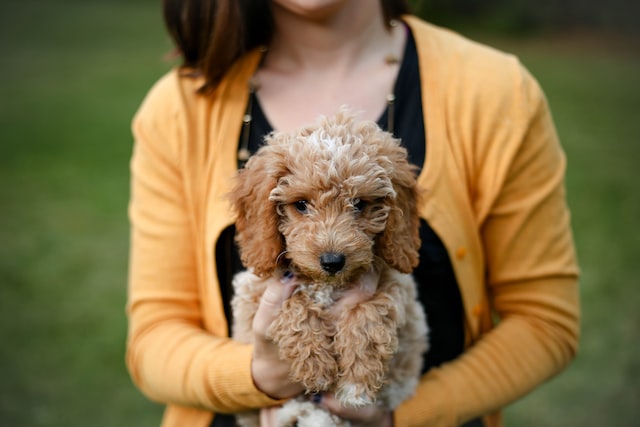You should know more about the breed if you’re considering getting a mini goldendoodle. It’s essential to know about its history, life span, allergies, and costs; this article will help you with that.
Contents
Sizes
When choosing a Goldendoodle, there are many different sizes to choose from. Selecting the best size for you and your family is a personal decision.
First, consider your lifestyle. If you’re active, choose a giant doodle. On the other hand, if you are more laid back, opt for a medium-sized doodle.
You should also assess your pet’s socialization needs. Depending on the breed, some dogs will be better suited for homes with more than one dog or child. A large dog can be intimidating to would-be intruders.
You should also look into doggie daycare and other pet-related services if you’re working a lot. It can be an excellent way to exercise your dog without leaving home.
A mini Goldendoodle is an excellent choice for first-time owners or owners who want to fit a pet into a small space. These dogs are adaptable and friendly. They love to play and are people, pleasers.
Mini Goldendoodles are classified into three categories. Each has distinct characteristics.
Coats
If you want to know more about the coats of mini goldendoodle breeders, consider doing some research. Goldendoodles are adorable and intelligent dogs that come in various colors and styles. Their tri-colored coat is a result of the genetic makeup of their parents.
When searching for a breeder, it is essential to find one that tests the DNA of their breeding dogs. This way, you can be sure that all of their puppies will have the correct coat. You should also be aware that some dogs tend to have the wrong coat type.
The Goldendoodle coat type is a result of its genetic makeup. It is typically found in the form of wavy or loose hair. These coats are easy to maintain and shed relatively little.
Another coat type is straight or flat-coated. Flat-coated Goldendoodles do not have the traditional teddy bear look and are more likely to shed. They are not recommended for allergy sufferers.
Lifespan
The Goldendoodle is a mix between a Golden Retriever and Poodle. These dogs are usually small in size. They have an average lifespan of 10 to 15 years. But they can live much longer than that if they are given the proper care.
One of the most critical factors in keeping your dog healthy is to make sure that they get enough exercise. You should take them for at least 30 minutes of moderate activity daily.
A good diet is also essential. You should feed them healthy, high-protein food free of artificial flavoring and colors.
Besides a healthy diet, you should also pay attention to dental hygiene. Goldendoodles are at risk for gum disease and periodontal disease, which can lead to serious health problems. Glucosamine and chondroitin can help maintain healthy joints.
Another factor that affects their lifespan is the quality of their genetic makeup. If both of their parents are tested and healthy, the pups will likely have fewer genetic health problems.
Cost
If you’re interested in getting a Mini Goldendoodle, you need to know what you’re getting into before you commit to purchasing one. Buying a puppy is not a cheap activity. It can cost hundreds or thousands of dollars, depending on your location. Fortunately, finding a reliable breeder is easier than you think.
Many factors influence the price of a Mini Goldendoodle. The size of the dog is usually a significant factor.
As a rule of thumb, larger dogs cost more than smaller ones. It is because puppy mills are usually able to produce the pups at a much faster rate.
You’ll also need to consider the health of the parents. Hip dysplasia, progressive retinal atrophy, and Von Willebrand’s disease are common problems. These conditions can cause arthritis and blindness in puppies.
Mini Goldendoodles are healthy, but they require special care. They can develop the same health issues as poodles, including separation anxiety. You’ll need to form a care routine when you bring the puppy home. Follow it for the rest of the dog’s life.
Allergies
Allergies are a possibility in any dog. It’s critical to understand the symptoms of an allergy as well as what you can do to avoid them. You don’t want your Goldendoodle to develop a skin infection, lose his hair, or even suffer from anaphylactic shock.
Goldendoodles, like most dogs, have several food allergies. Wheat, beef, eggs, and dairy are common culprits. Fortunately, most of these are treatable. Your vet will be able to recommend the best course of action.
Keeping your house clean is also an excellent way to reduce the spread of allergens. It can be accomplished by using a high-quality hypoallergenic shampoo and conditioner. Also, bathing your dog regularly will help reduce the dander buildup on your dog’s coat.
In addition, you can help prevent your dog from developing an allergy by switching to grain-free foods. Many famous brands have created memorable lines of dog food designed to ward off-grain sensitivities.
Vaccinating your puppy is another way to decrease his risk of developing an allergy. Antibiotic usage during the early stages of puppyhood has been demonstrated in studies to enhance a dog’s likelihood of acquiring an allergy.




